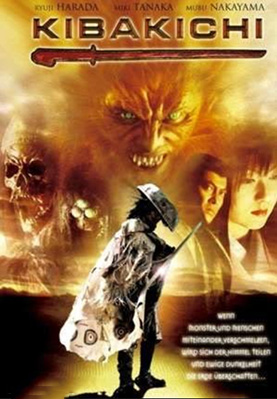
Kibakichi (2004)
Ryuji Harada plays Kibakichi, a swordsman and werewolf who is constantly under attack by bounty hunters while traveling through the countryside to escape his past. Kibakichi discovers a village of Yokai, monsters like himself that have assumed the personas of human beings in order to survive. The Yokai are working on a deal with the yakuza to give them a place to lead their lives as they want to. Kibakichi warns the Yokai not to trust humans and just as he is about to leave, the yakuza, led by Yomaji (Mubu Nakayama), betray the Yokai and launch a violent assault on their village. Caught in the crossfire, Kubakichi uses his superior sword-fighting skills and his powers as a Yokai to defend his kind.
Director Tomoo Haraguchi brings this wild and explosive horror fantasy film to life. Kibakichi superbly combines traditional Japanese monsters with action movie bravado resulting in a jaw dropping experience. The choreography in the sword fighting scenes and the stunt work in the film’s finale are excellent.
The special effects are simplistic but ambitious. The Yokai, taken straight from Japanese lore, look great and there is plenty of blood and gore (both red and blue) spilled throughout. Various filters are used to dowse the film in gorgeous earth tones, giving Kibakichi its own unique and proto-classic look.
The streamlined plot revels in its traditional “lone swordsman” storyline but removes all traces of subtlety to keep in step with the director’s crowd-pleasing style. The action just keeps on coming rarely slowing to allow any audience to lose interest. Even the film’s message is trite: human beings ruin everything.
The actors in Kibakichi perform with a very representational acting style making the film feel like a bizarre theatrical production. This style complements the film’s script, which is laden with melodrama and moments meant to tug on the viewer’s heartstrings. Ryuji Harada is perfect as the stone-faced and deadly Kibakichi.
Kibakichi is one hell of an ambitious and truly weird film. It breaks all the rules of its multiple genres (just check out the yakuza’s arsenal) and yet still captures the conventions that make samurai films so memorable. Most viewers will find it difficult not to be blown away by the sheer bombastic audacity of the film’s climax. Followed by a crappy sequel.